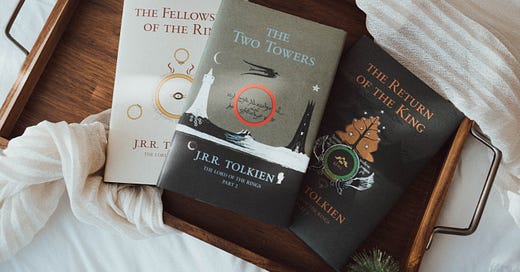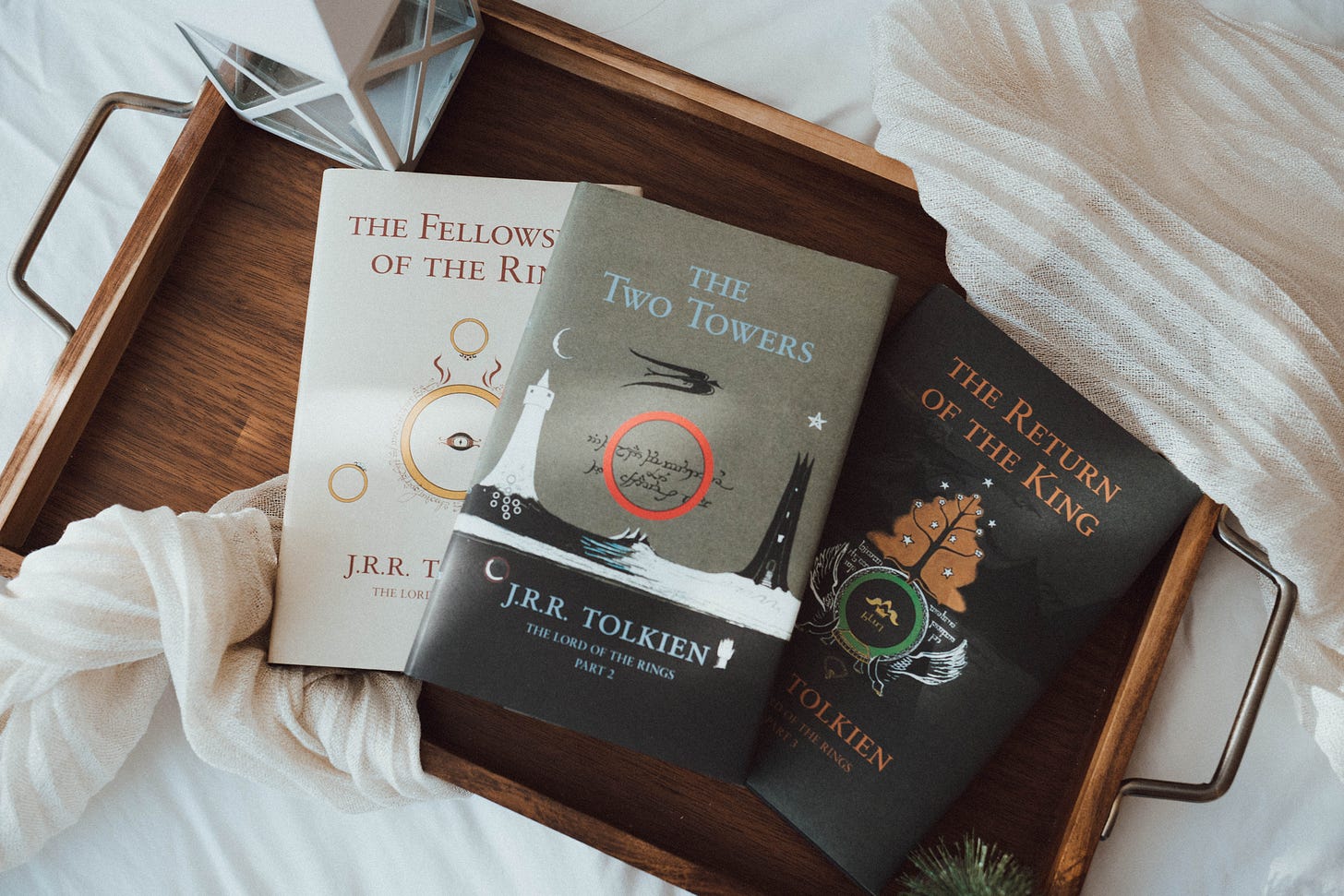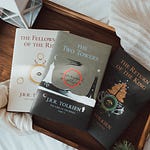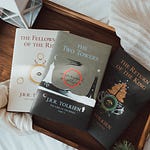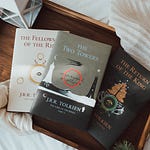Hello and welcome to Notes from the Town Hermit, a haven for the overthinkers and deep-feelers who search for reasons why life should be worth living. I write so you feel seen by giving words to the unspeakable. Upgrade to gain the keys to our Fellowship and find your kindred spirits.
Dear Inklings,
We are reading The Fellowship of the Ring by J.R.R. Tolkien this month. If you’re new here, my essays for this book challenge will always be free to read, but the journaling exercises and discussions are for patrons. I also share more of my personal experiences in that section. We will be going deep and I want the space to be an intimate one. I hope you will choose to participate in our Fellowship!
Click here for the main page and reading schedule.
While The Lord of the Rings is an epic fantasy, depicting a life-threatening, world-altering quest, the story within Tolkien’s three books is but one small piece of a much larger history. It bridges the old world and the new, giving us a modern myth of the decline of magic—marked by the departure of the Elves, destruction of the Ring (and with it, that of other ruling Rings)—and a believable tale of how our current world may have come to be.
In our reading this week, we see evidence of this history etched into the very landscape itself. It’s no accident that our characters voice songs and stories of a distant past, even as they are making a desperate escape to Rivendell. In the coldness of the wild, “[Aragorn] began to tell them tales to keep their minds from fear. He knew many histories and legends of long ago, of Elves and Men and the good and evil deeds of the Elder Days.” They meet Tom Bombadil and also learn about the Barrow-wights, Gil-galad and the Last Alliance that fought against Mordor, the love story of Beren and Lúthien—all while they travel across a land shaped by ancient history.
wrote an illuminating and detailed article on this theme.As they journey on, our characters’ remembrance of the past becomes a well of comfort for them. This has been true during storms in my own life also. I wrote once,
“I think I love history so much because it helps me feel less alone. I can look at all those people who came before me, who have experienced lives just as real to them as mine is to me. Tragedy and loss used to be so accepted and normal it was woven into the fabric of being. It comforts me to know I am not the only mother who has lost children, that my life is hardly the worst to have been lived.” —Fractured Perspectives on Loss
Barrow-wights1 capture the hobbits in the Old Forest and there seems no hope of escape, “But though [Frodo’s] fear was so great that it seemed to be a part of the very darkness that was round him, he found himself as he lay thinking about Bilbo Baggins and his stories, of their jogging along together in the lanes of the Shire and talking about roads and adventures.”
Later, when Aragorn and the hobbits are fleeing the Black Riders to Rivendell, they come across the very same trolls Bilbo did in The Hobbit. Trembling with fear at first, they remember from just a recent past, that trolls turn to stone in the daylight.
“Well!” [Frodo] said. “We are forgetting our family history!” […] They all laughed. Frodo felt his spirits reviving: the reminder of Bilbo’s first successful adventure was heartening (emphasis mine).
The hobbits know little of the broader history of Middle-earth; none of them have even stepped outside their small world of the Shire, yet just their own family lore is enough to give them courage.
From “small” history to “large” history
Not only do personal family stories provide the hobbits with encouragement, in an indirect way, the larger history does also.
A phrase stood out to me as I read the part when Aragorn tells the hobbits about Beren and Lúthien. He says, “In those days the Great Enemy, of whom Sauron of Mordor was but a servant, dwelt in Angband in the North, and the Elves of the West coming back to Middle-earth made war upon him […] (emphasis mine).”
This Great Enemy is Melkor, later known as Morgoth. He was one of the Valar, who are (in a grossly simplified explanation) celestial beings who had helped shape the making of the world during its creation. He rebelled against the Creator, Eru, and became the first Dark Lord. Eru later created lesser beings called Maiar, as subordinates to the Valar.
Sauron is a Maiar, which is to say, he is less powerful than Morgoth.
And yet, we know from The Silmarillion that Morgoth was eventually defeated. None of the characters know how their story will end yet, but they can draw strength from this. When Aragorn tells the hobbits this story and makes what seems to be a passing statement, Tolkien draws our attention back to the fact that this piece in his legend is merely: one small piece.
The events of The Lord of the Rings are, indeed, dire. When Pippin is with Gandalf later, in The Return of the King, Gandalf says, “There never was much hope. Just a fool's hope, as I have been told.”
If The Lord of the Rings is Tolkien’s pre-history of the world, we can draw comfort from it, too.
Many of us feel like we are alone with our experiences. Through books and history, we often and quickly find we are not. I think again of Gandalf teaching Frodo the history of Ring in chapter 2, “The Shadow of the Past,” when he lays out the threads that have led the Ring to Frodo. He tells Frodo that “that may be an encouraging thought.”
It reminds me of what we often forget in the midst of troubling times: that previous generations have each had their troubles—some worse than ours—they may look different through the ages, yet our human struggles have continued for eons, and so has the human spirit.
We may or may not have a modern-day Sauron trying to destroy and subdue the world to their will, but we do face evil. None can deny we live in a time of great upheaval, fear, and doubt. Many times, it seems as though the Shadow has never been deeper.
However, like Frodo, his companions, and Aragorn, may we look to those who have fought against Shadows even greater than our own. Each of their battles has paved a way to make ours a little easier.
Our time in the world is a dot on the tapestry. It doesn’t make our sorrows and joys lesser than those that came before; rather, it gives us hope.
For next week, read Book 2, chapters 1-4, up to “The Bridge of Khazad-Dûm.”


